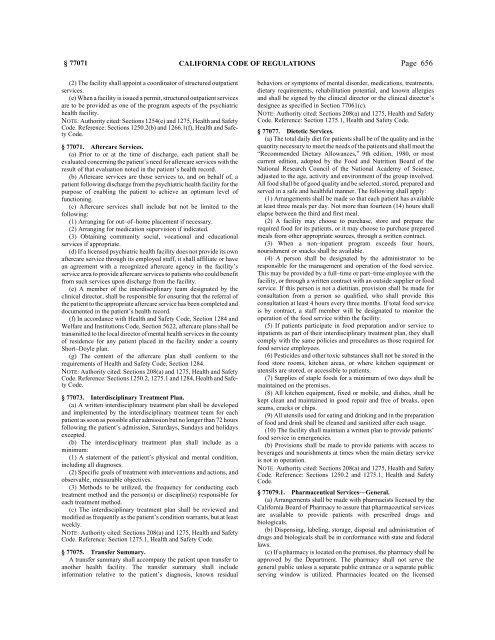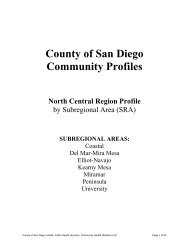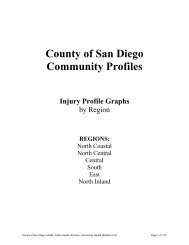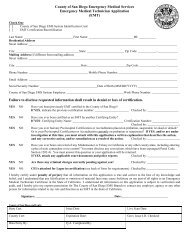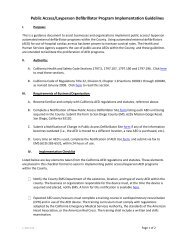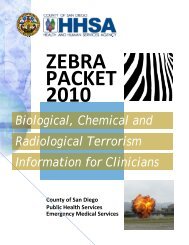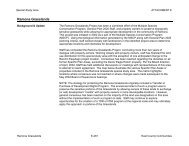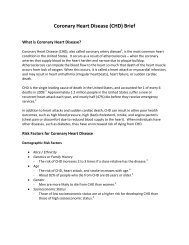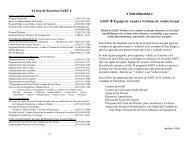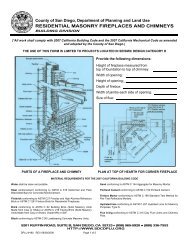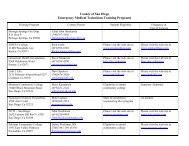CALIFORNIA CODE OF REGULATIONS - State of California
CALIFORNIA CODE OF REGULATIONS - State of California
CALIFORNIA CODE OF REGULATIONS - State of California
Create successful ePaper yourself
Turn your PDF publications into a flip-book with our unique Google optimized e-Paper software.
§ 77071 <strong>CALIFORNIA</strong> <strong>CODE</strong> <strong>OF</strong> <strong>REGULATIONS</strong><br />
Page 656<br />
(2) The facility shall appoint a coordinator <strong>of</strong> structured outpatient<br />
services.<br />
(e) When a facility is issued a permit, structured outpatient services<br />
are to be provided as one <strong>of</strong> the program aspects <strong>of</strong> the psychiatric<br />
health facility.<br />
NOTE: Authority cited: Sections 1254(e) and 1275, Health and Safety<br />
Code. Reference: Sections 1250.2(b) and 1266.1(f), Health and Safety<br />
Code.<br />
§ 77071. Aftercare Services.<br />
(a) Prior to or at the time <strong>of</strong> discharge, each patient shall be<br />
evaluated concerning the patient’s need for aftercare services with the<br />
result <strong>of</strong> that evaluation noted in the patient’s health record.<br />
(b) Aftercare services are those services to, and on behalf <strong>of</strong>, a<br />
patient following discharge from the psychiatric health facility for the<br />
purpose <strong>of</strong> enabling the patient to achieve an optimum level <strong>of</strong><br />
functioning.<br />
(c) Aftercare services shall include but not be limited to the<br />
following:<br />
(1) Arranging for out–<strong>of</strong>–home placement if necessary.<br />
(2) Arranging for medication supervision if indicated.<br />
(3) Obtaining community social, vocational and educational<br />
services if appropriate.<br />
(d) If a licensed psychiatric health facility does not provide its own<br />
aftercare service through its employed staff, it shall affiliate or have<br />
an agreement with a recognized aftercare agency in the facility’s<br />
service area to provide aftercare services to patients who could benefit<br />
from such services upon discharge from the facility.<br />
(e) A member <strong>of</strong> the interdisciplinary team designated by the<br />
clinical director, shall be responsible for ensuring that the referral <strong>of</strong><br />
the patient to the appropriate aftercare service has been completed and<br />
documented in the patient’s health record.<br />
(f) In accordance with Health and Safety Code, Section 1284 and<br />
Welfare and Institutions Code, Section 5622, aftercare plans shall be<br />
transmitted to the local director <strong>of</strong> mental health services in the county<br />
<strong>of</strong> residence for any patient placed in the facility under a county<br />
Short–Doyle plan.<br />
(g) The content <strong>of</strong> the aftercare plan shall conform to the<br />
requirements <strong>of</strong> Health and Safety Code, Section 1284.<br />
NOTE: Authority cited: Sections 208(a) and 1275, Health and Safety<br />
Code. Reference: Sections 1250.2, 1275.1 and 1284, Health and Safety<br />
Code.<br />
§ 77073. Interdisciplinary Treatment Plan.<br />
(a) A written interdisciplinary treatment plan shall be developed<br />
and implemented by the interdisciplinary treatment team for each<br />
patient as soon as possible after admission but no longer than 72 hours<br />
following the patient’s admission, Saturdays, Sundays and holidays<br />
excepted.<br />
(b) The interdisciplinary treatment plan shall include as a<br />
minimum:<br />
(1) A statement <strong>of</strong> the patient’s physical and mental condition,<br />
including all diagnoses.<br />
(2) Specific goals <strong>of</strong> treatment with interventions and actions, and<br />
observable, measurable objectives.<br />
(3) Methods to be utilized, the frequency for conducting each<br />
treatment method and the person(s) or discipline(s) responsible for<br />
each treatment method.<br />
(c) The interdisciplinary treatment plan shall be reviewed and<br />
modified as frequently as the patient’s condition warrants, but at least<br />
weekly.<br />
NOTE: Authority cited: Sections 208(a) and 1275, Health and Safety<br />
Code. Reference: Section 1275.1, Health and Safety Code.<br />
§ 77075. Transfer Summary.<br />
A transfer summary shall accompany the patient upon transfer to<br />
another health facility. The transfer summary shall include<br />
information relative to the patient’s diagnosis, known residual<br />
behaviors or symptoms <strong>of</strong> mental disorder, medications, treatments,<br />
dietary requirements, rehabilitation potential, and known allergies<br />
and shall be signed by the clinical director or the clinical director’s<br />
designee as specified in Section 77061(c).<br />
NOTE: Authority cited: Sections 208(a) and 1275, Health and Safety<br />
Code. Reference: Section 1275.1, Health and Safety Code.<br />
§ 77077. Dietetic Services.<br />
(a) The total daily diet for patients shall be <strong>of</strong> the quality and in the<br />
quantity necessary to meet the needs <strong>of</strong> the patients and shall meet the<br />
“Recommended Dietary Allowances,” 9th edition, 1980, or most<br />
current edition, adopted by the Food and Nutrition Board <strong>of</strong> the<br />
National Research Council <strong>of</strong> the National Academy <strong>of</strong> Science,<br />
adjusted to the age, activity and environment <strong>of</strong> the group involved.<br />
All food shall be <strong>of</strong> good quality and be selected, stored, prepared and<br />
served in a safe and healthful manner. The following shall apply:<br />
(1) Arrangements shall be made so that each patient has available<br />
at least three meals per day. Not more than fourteen (14) hours shall<br />
elapse between the third and first meal.<br />
(2) A facility may choose to purchase, store and prepare the<br />
required food for its patients, or it may choose to purchase prepared<br />
meals from other appropriate sources, through a written contract.<br />
(3) When a non–inpatient program exceeds four hours,<br />
nourishment or snacks shall be available.<br />
(4) A person shall be designated by the administrator to be<br />
responsible for the management and operation <strong>of</strong> the food service.<br />
This may be provided by a full–time or part–time employee with the<br />
facility, or through a written contract with an outside supplier or food<br />
service. If this person is not a dietitian, provision shall be made for<br />
consultation from a person so qualified, who shall provide this<br />
consultation at least 4 hours every three months. If total food service<br />
is by contract, a staff member will be designated to monitor the<br />
operation <strong>of</strong> the food service within the facility.<br />
(5) If patients participate in food preparation and/or service to<br />
inpatients as part <strong>of</strong> their interdisciplinary treatment plan, they shall<br />
comply with the same policies and procedures as those required for<br />
food service employees.<br />
(6) Pesticides and other toxic substances shall not be stored in the<br />
food store rooms, kitchen areas, or where kitchen equipment or<br />
utensils are stored, or accessible to patients.<br />
(7) Supplies <strong>of</strong> staple foods for a minimum <strong>of</strong> two days shall be<br />
maintained on the premises.<br />
(8) All kitchen equipment, fixed or mobile, and dishes, shall be<br />
kept clean and maintained in good repair and free <strong>of</strong> breaks, open<br />
seams, cracks or chips.<br />
(9) All utensils used for eating and drinking and in the preparation<br />
<strong>of</strong> food and drink shall be cleaned and sanitized after each usage.<br />
(10) The facility shall maintain a written plan to provide patients’<br />
food service in emergencies.<br />
(b) Provisions shall be made to provide patients with access to<br />
beverages and nourishments at times when the main dietary service<br />
is not in operation.<br />
NOTE: Authority cited: Sections 208(a) and 1275, Health and Safety<br />
Code. Reference: Sections 1250.2 and 1275.1, Health and Safety<br />
Code.<br />
§ 77079.1. Pharmaceutical Services—General.<br />
(a) Arrangements shall be made with pharmacists licensed by the<br />
<strong>California</strong> Board <strong>of</strong> Pharmacy to assure that pharmaceutical services<br />
are available to provide patients with prescribed drugs and<br />
biologicals.<br />
(b) Dispensing, labeling, storage, disposal and administration <strong>of</strong><br />
drugs and biologicals shall be in conformance with state and federal<br />
laws.<br />
(c) If a pharmacy is located on the premises, the pharmacy shall be<br />
approved by the Department. The pharmacy shall not serve the<br />
general public unless a separate public entrance or a separate public<br />
serving window is utilized. Pharmacies located on the licensed


